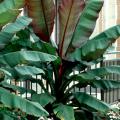News From 2003
MISSISSIPPI STATE -- Mississippi's shrimp season has been on-again, off-again because of rain, but landings to date have been good.
Dave Burrage, Extension professor of marine resources at Mississippi State University's Coastal Research and Extension Center, said Biloxi saw about 1.4 million pounds of shrimp landed the first two weeks of the season. The shrimp season opened June 10, closed June 20, then the western portion reopened June 28.
By Norman Winter
MSU Horticulturist
Central Mississippi Research & Extension Center
Wherever I've gone this summer -- the Atlanta Botanical Garden, Park Seed Trials in South Carolina, even the landscape at North Park Mall in Jackson -- the Magilla Perilla has performed wonderfully.
Magilla Perilla became famous before gardeners even got a chance to try it. It is the plant that has shoppers everywhere counting the days until it is available at local garden centers.
MISSISSIPPI STATE -- Extracurricular activities not only give children something to do in their free time, but involvement in these activities promotes a positive sense of self and decreases the chance a child will drop out of school.
By Laura Whelan
MISSISSIPPI STATE -- As children and teens head back to school this fall, they can feel comfortable sporting their own personal style.
"Fashion emphasizes a really mixed look right now. The rules of fashion are not as hard and fast as they used to be," said Wanda Cheek, assistant professor of apparel, textiles and merchandising in Mississippi State University's School of Human Sciences.
MISSISSIPPI STATE -- Getting ready for the new school year can be expensive, but parents don't have to give up the budget in frustration when it's time to buy back-to-school supplies.
The beginning of the school year means children need seasonal clothes and a whole list of school supplies. Purchased at one time, the bill can be staggering, especially when shopping at the last minute or for more than one child.
MISSISSIPPI STATE -- Parents need to get an early start and stay involved when it comes to their children's education -- and their ability to develop good study skills.
Experts say parents can set a good learning example for their children to follow long before they reach school age.
MISSISSIPPI STATE -- Several years after their introduction, school uniforms are performing as expected. And as expected, many students don't like wearing them.
Their use has been credited with reduced behavioral problems and better learning environments. The U.S. Department of Education outlines their usefulness and regulations in an online manual on the subject.
MISSISSIPPI STATE -- Tropical Storm Bill and a very wet June mean the state's major row crops stayed waterlogged, but producers aren't ready to call the season a wash.
The southern and eastern parts of the state saw most of the rainfall in June, but the northern and western crops didn't escape the soaking, averaging as much as 14 percent more than the normal amount of rainfall in some areas. Central and east-central crops received double the normal amount in June.
MISSISSIPPI STATE -- The majority of cotton growers in the north Mississippi Delta want to take part in region-wide efforts to eradicate boll weevils in their fields, but another referendum will be necessary if the Southeastern program will continue locally after 2003.
MISSISSIPPI STATE -- First impressions count. For many visitors to Mississippi, the state's highways are the first thing they see and the condition of the roadsides can make a lasting impression.
A partnership between the Mississippi Department of Transportation and Mississippi Agricultural and Forestry Experiment Station scientists at Mississippi State University is helping keep roadways attractive for visitors and residents alike by management of rights-of-way vegetation.
By Norman Winter
MSU Horticulturist
Central Mississippi Research & Extension Center
It seems the gardening public has finally discovered the most beautiful banana in the world, the Red Abyssinian. This banana is not the least bit cold-hardy, but who cares when it grows like a rocket and makes a landscape statement from spring until the first frost in the fall?
The Red Abyssinian is known botanically as Ensete ventricosum Maurelii. Most of the bananas we grow are of the genus Musa.
By Laura Whelan
MISSISSIPPI STATE -- Although Equine Infectious Anemia is not a new threat to horse health, its potentially deadly consequences and lack of a cure make it an especially harmful risk.
"EIA has commanded a great deal of attention over the years," said Dr. Stanley Robertson, Mississippi State University Extension Service veterinarian. "This disease has no vaccine, treatment or cure, and it is often difficult to differentiate it from other fever producing diseases, like anthrax, influenza and equine encephalitis."
MISSISSIPPI STATE -- Wet weather through most of spring doubled the time it takes to get cotton planted, and the crop was in widely varying stages of development by the end of June.
Will McCarty, cotton specialist with the Mississippi State University Extension Service, said the statewide crop is non-uniform because of excessive rains that delayed cotton plantings, drowned out emerging stands and stunted other areas. Some crops had to be replanted.
MISSISSIPPI STATE -- Two Mississippi State University dietetic programs earned national reaccreditation in April and will continue to produce job-ready graduates.
The Commission on Accreditation for Dietetics Education of the American Dietetic Association renewed the accreditation for MSU's undergraduate Didactic Program in Dietetics and graduate Dietetic Internship program.
The programs successfully completed national requirements that included a self-study and a site visit. The accreditation extends for 10 years with a review to be conducted in 2007.
MISSISSIPPI STATE -- The first phase of an economic impact study has revealed almost a billion dollars are invested in the Mississippi horse industry's infrastructure.
Agricultural economists with the Mississippi Agricultural and Forestry Experiment Station completed the study of the industry's investment in arenas, barns, towing vehicles, horse trailers, fencing and land.
By Norman Winter
MSU Horticulturist
Central Mississippi Research & Extension Center
The past couple of weeks have seen my woodland trails look like small, flowing tributaries of the Mississippi River. My dry creek has been flowing, and rain is still in the forecast.
What kind of plant can tolerate such wet conditions? I am so glad you asked because one of the most elegant and striking plants for boggy conditions or upland soil is the umbrella palm.
MISSISSIPPI STATE -- Statistical data probably doesn't mean a lot to a single mother struggling to raise two children in the Mississippi Delta on income from a minimum wage job.
Analysis of statistical data by scientists at Mississippi State University's Social Science Research Center may, however, help her obtain the healthcare and other services her children need, or even a better paying job.
MISSISSIPPI STATE -- A recent case of Eastern equine encephalitis in Lamar County should remind owners of the importance of vaccinating horses against mosquito-borne diseases.
Eastern equine encephalitis is similar to West Nile virus in that it is spread primarily by mosquitoes that have fed on infected birds. EEE is spread by the Culiseta melanura mosquito and in horses is almost always fatal.
MISSISSIPPI STATE -- Farmers will remember 2002 for the wet harvest season, but economists will remember the depressed markets across the board that resulted in a 6 percent decline from the previous year's agricultural values.
Final numbers are in from the 2002 crops, and Mississippi agricultural economists are finding tallies near last December's expectations. The grand total of all the state's commodities plus government payments is $4.5 billion, down from $4.8 billion in 2001. (See Mississippi Value of Production Estimates)
MISSISSIPPI STATE -- Anyone who has ever tried to stack watermelons has probably thought to themselves, "Wouldn't it be great if these things were square?"
It's an idea that's caught on in Japan, where small, square melons command premium prices -- more than $80 each; about triple what traditional round melons cost in Japanese produce markets.
Pages
News Types
- Crop Report (426)
- Feature Story (5900)
- Feature Photo (53)
- Extension Outdoors (319)
- Southern Gardening (1477)
- Extension Inbox (95)
Archive
- 2025 (86)
- 2024 (186)
- 2023 (182)
- 2022 (183)
- 2021 (176)
- 2020 (211)
- 2019 (222)
- 2018 (276)
- 2017 (336)
- 2016 (381)
- 2015 (456)
- 2014 (495)
- 2013 (487)
- 2012 (491)
- 2011 (354)
- 2010 (320)
- 2009 (313)
- 2008 (272)
- 2007 (263)
- 2006 (252)
- 2005 (278)
- 2004 (270)
- 2003 (279)
- 2002 (227)
- 2001 (238)
- 2000 (241)
- 1999 (231)
- 1998 (231)
- 1997 (239)
- 1996 (58)
- 1995 (36)



